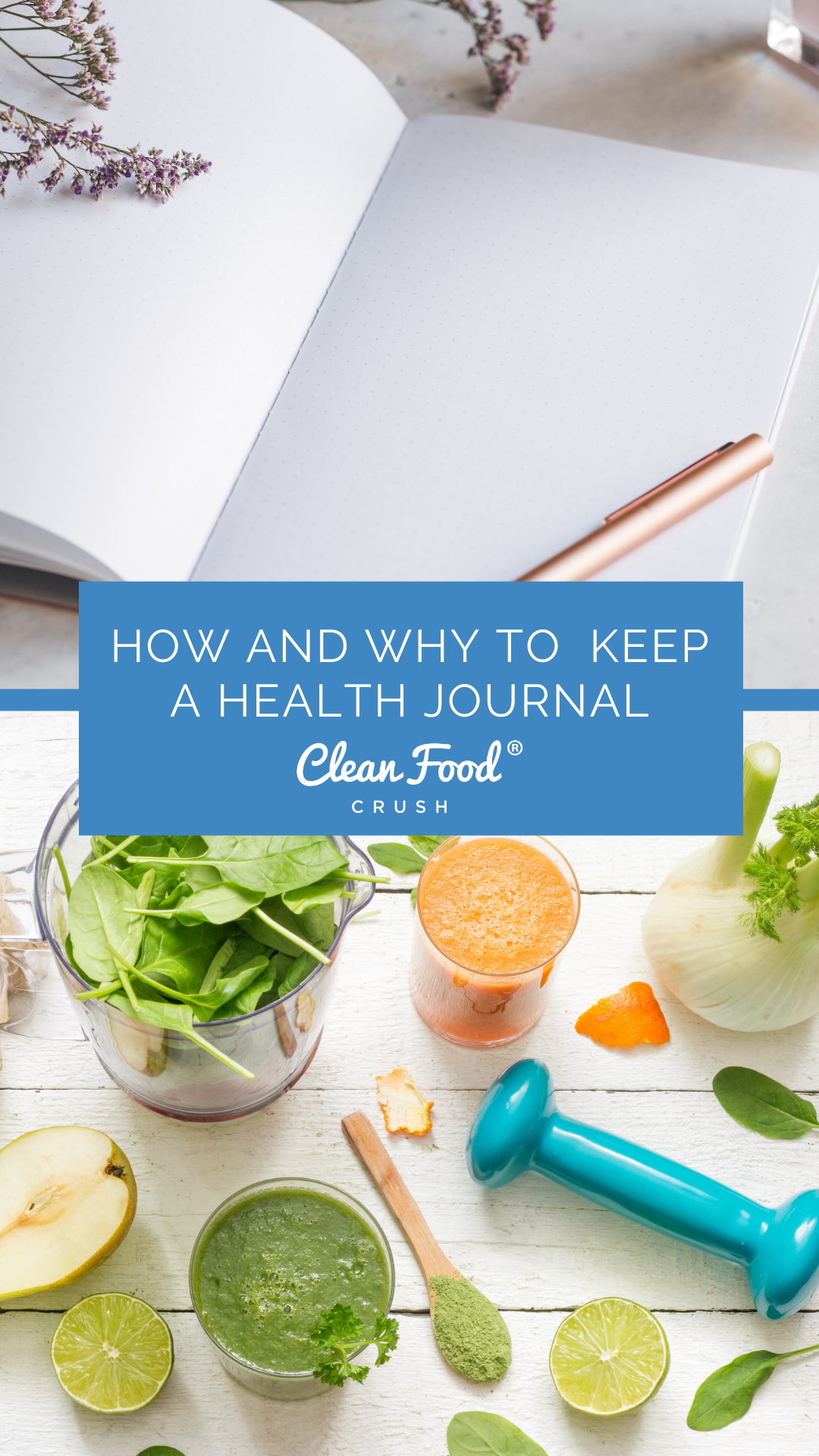

How would you rate your overall health, and how confident do you feel in your answer? If your answer’s rating or confidence level is low, you may want to consider keeping a health diary.
You may think of a diary as a relic of the past, collecting dust from Middle School days when every page was filled with who likes who doodles of your crush’s name. But the truth is, diaries and journals can be so useful for anyone of any age. Especially health journals.
How and Why to Keep a Health Journal
A personal health journal is meant to help you keep track of your overall health. It’s a physical record of every aspect of your health, so you’re aware of your own body and history. The exercise of keeping a journal can help you have a clearer view of your lifestyle choices, how they affect how you feel, and give your overall well-being a needed boost. This knowledge allows you to take more control of your healthcare, be a better patient, make better decisions, and personally see your health journey.
Your diary can act as a personal health assistant, when used right, and can give you great insights. So, perhaps your log is much more centralized on a single topic or issue. Some ideas of more specific journals include, but are not limited to, a Cardiovascular Disease Diary, a Nutrition Diary, a Gluten-Free Diary, a Sexual Health Diary, a Pregnancy Diary, a Diabetes Diary, a Food Allergies Diary, a Sleep Diary, or a Baby Health Diary.
I will be focusing on the broader Health Diary (and whatever topic you’re focusing on, try to look at every aspect of your life, as they can affect one another). Whatever your reason or topic, there are so many benefits reasons for keeping a health journal. As this piece in The New York Times points out: “Scientific studies have shown it to be essentially a panacea for modern life. There are the obvious benefits, like a boost in mindfulness, memory and communication skills. But studies have also found that writing in a journal can lead to better sleep, a stronger immune system, more self-confidence and a higher I.Q.”
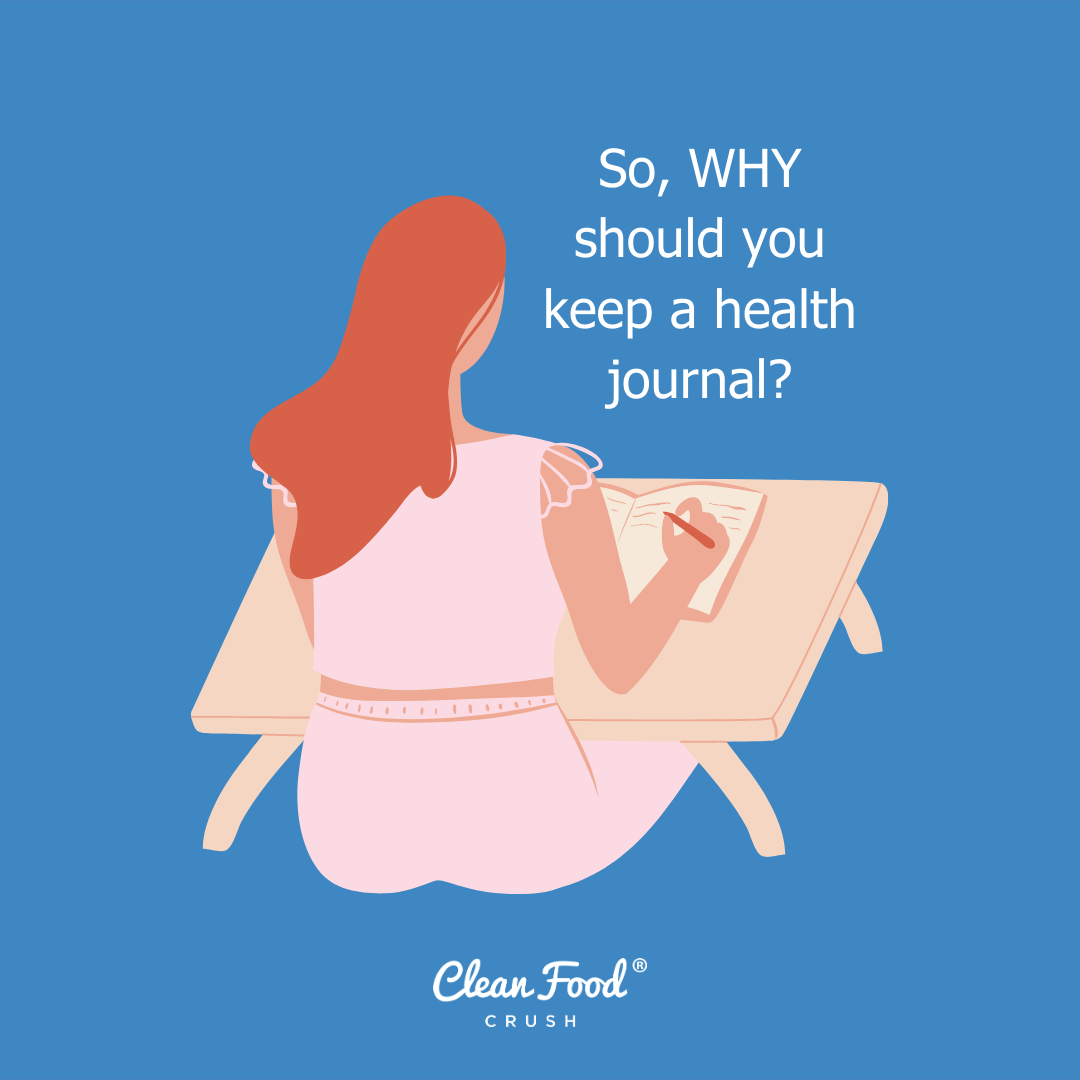
Keeping A Health Journal: The WHY
➡️ Health Issues
Perhaps the most important reason to keep a health journal is to keep track of or get insight on different health issues. Maybe you need a new way to address problems such as obesity, inflammation, or high blood pressure. Or you could pre-diabetic or diabetic and now have to apply much more mental time and energy to your health. Keeping a health journal can be a huge advantage when it comes to addressing health issues.
If your decision to start keeping a journal starts and ends with this reason, that’s okay. If that’s the case, I would encourage you to finish reading this entire article and keep a well-rounded journal.
➡️ Noticing the Previously Invisible
As I said earlier, a health diary or journal can help you understand yourself and your health. By writing everything down, you may begin to understand things about your dietary needs and choices that you weren’t previously aware of. Maybe you see a direct correlation to headaches and a specific meal. Or, you’ll figure out why you have nights of horrible sleep after seeing that good nights of sleep often follow days you actually exercised. Maybe you’ll notice a connection to your stress levels.
Keeping the journal will help you see how lifestyle and diet factors intermingle with one another. Diet plays a tremendous role in the health of your skin, hair, and gut. It also affects the quality of your sleep. Vice Versa, sleep, exercise, stress, etc. will play a huge role on your diet and what foods your body craves. Tracking both will help you see what was previously invisible: what changes are most important for YOU so YOU can be the healthiest YOU yet.
Whatever it is, a detailed health journal can help you know your own body better than before.
➡️ Food Allergies or Intolerances
Similar to the aforementioned reason, keeping a health diary can help you discover or control a food allergy or intolerance. You’ll be more likely to figure out which foods cause symptoms, bowel disturbances, skin issues, or other problems. Whenever you have a reaction, go back to your record and see what the common factors are. Check your diary to see if you might have eaten gluten, dairy, sugar, nuts, eggs, shellfish, or other common aggravating foods.
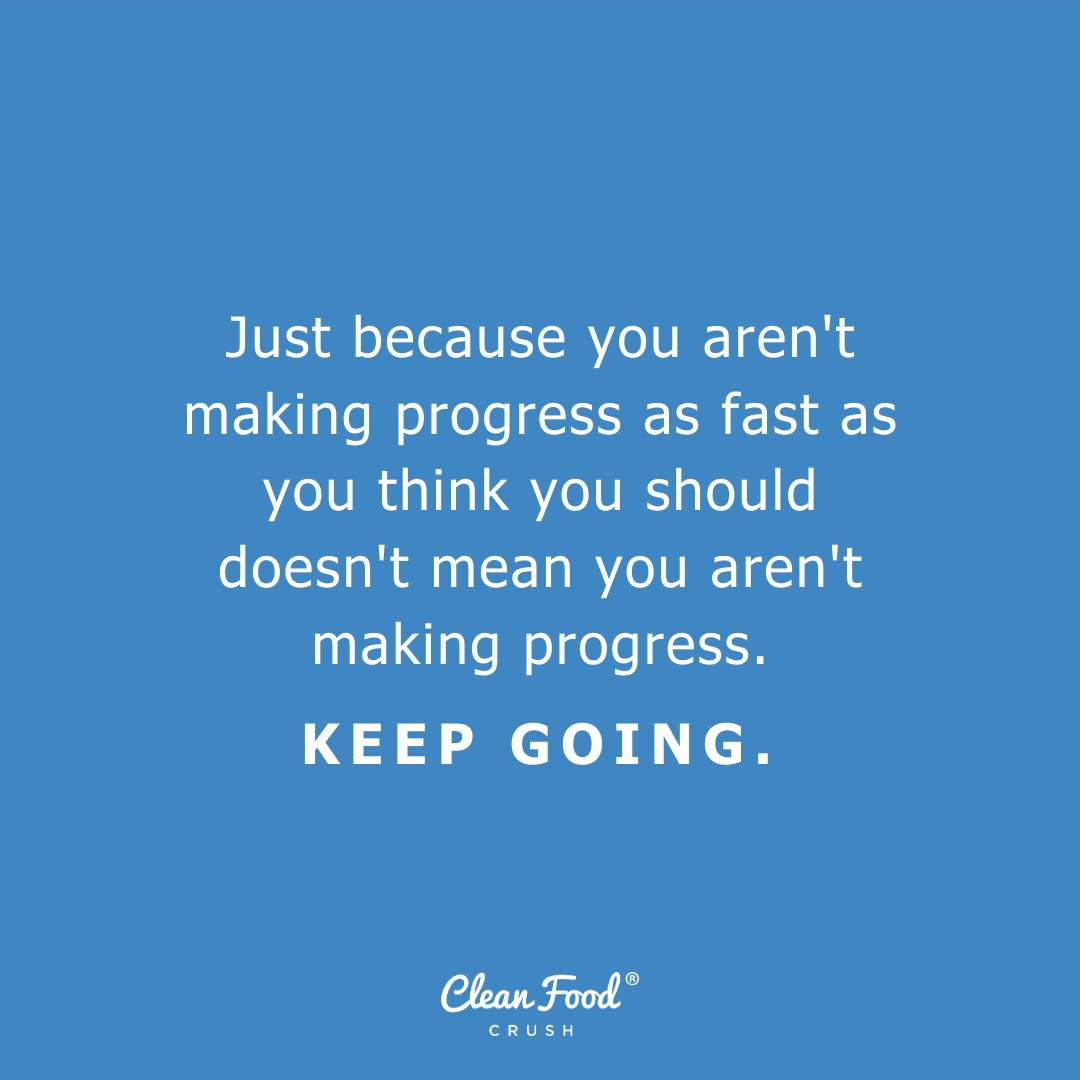
➡️ Avoiding Ruts
I know I can’t be the only one that will fall off the health wagon or fall into ruts, or seasons, where I seem to be sleeping worse, working out less, or just generally making poor health decisions. The truth is, journaling can help avoid these times. It’s like your journal is your very own accountability partner. Through making everyday entries in your journal, you are keeping yourself accountable and encouraging yourself to keep it up.
Journaling will help you notice when foods or lifestyle factors cause you to fall astray on your health plan. Maybe a night at your friend’s house where you enjoy one too many cookies leads to food binges. Or maybe a stressful day at work causes lack of sleep that night. If you keep track of this stuff and start to notice it, you can avoid it next time and start prioritizing certain lifestyle choices to better keep you on track.
💡 Quick tip – If you really want to stay accountable, keep a journal in a public place so that others can encourage and support you along the way.
➡️ Creates Habits and Organization.
Writing and journaling are inherently organizational acts, so applying it to your health can be the perfect first step to organizing your health journey. Prepare what you’re going to journal about and how ahead of time so you can have a perfectly organized journal. That way, the rest of your life can start falling into the organization of those pages.
Like anything else, writing regularly in your journal will create a habit. And the practice of recording your health in the pages of a journal will bleed into your daily life, helping you make a habit out of making healthy decisions. Whether you have specific, personal goals, you’ve set or just want to be more mindful of your overall health, getting in the habit of tracking your activities, choices, and emotions can help you build healthier habits.
➡️ You’ll Be Your Doctor’s Favorite Patient
Do you ever sit in the most awkward silence after your doctor has asked you a question about your health history? It could be anything from when your last menstrual cycle was to how much you drink a week to the correlation between your diet and mental health. If you don’t know what’s going on with you, then how is your doctor supposed to help you?
You don’t have to analyze the information in your journal yourself. I know that can be overwhelming and nearly impossible. But if you have this information, your doctor can be SO much more helpful and may be able to pinpoint causes of medical issues such as mental health problems, allergies, high blood pressure, and other diseases.
Having your health journal in front of you will instantly make you the favorite patient in any doctor’s office.
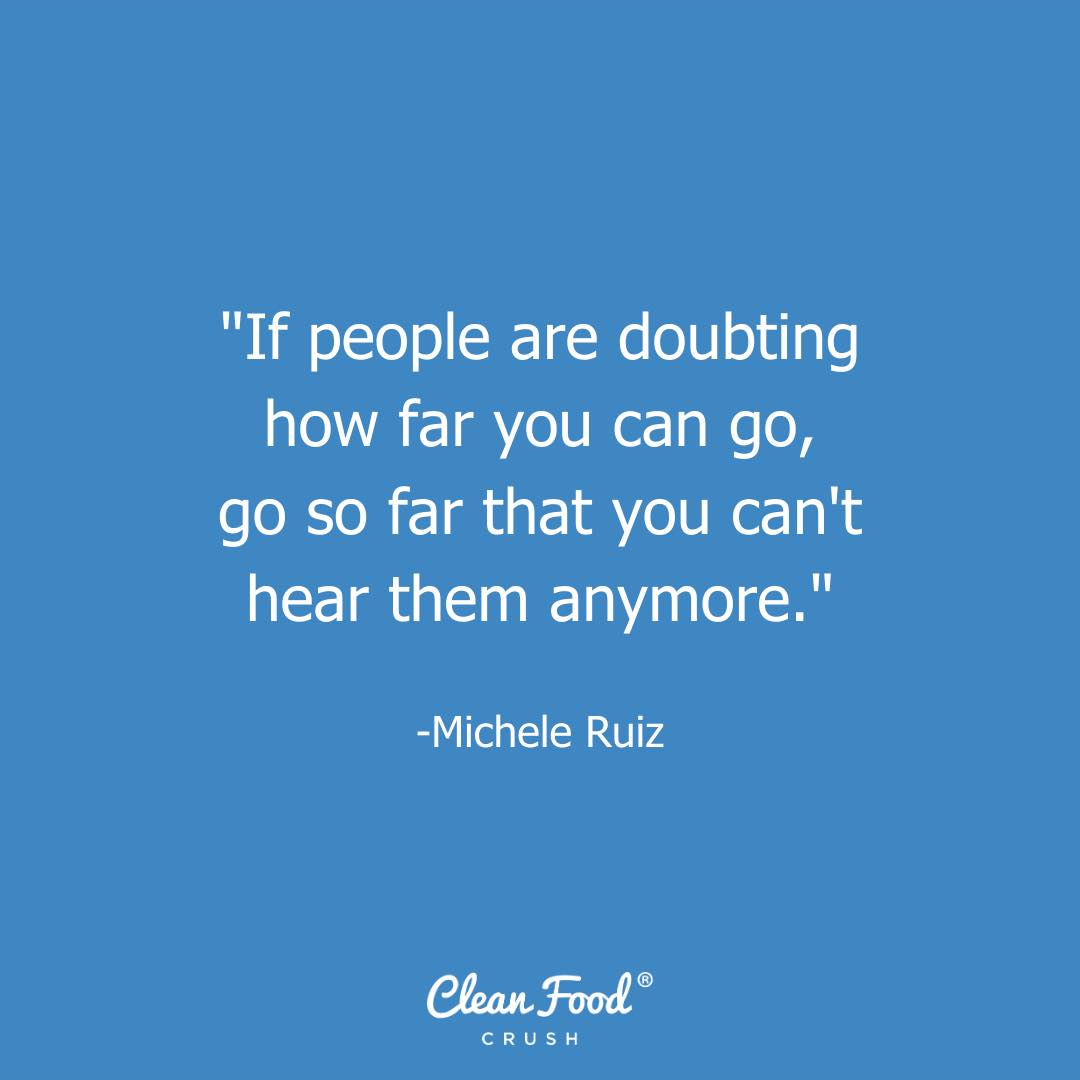
➡️ Journaling Tells Your Brain This is Important
Anything you spend time doing is essential to you. If you spend time watching TV, then maybe that show is important to you. Or, perhaps, that’s time you spend with your husband or child, which is what’s important. Or, it could just be the way you relax and recharge after a long day, which is equally important. Choosing to do something and dedicate your time to it communicates its importance to your brain. As a Huffington Post contributor noted, “Writing goals signals to your brain, “this is important.” Your reticular activating system then flags relevant opportunities and tools to achieve that goal. More detailed goals provide a psychological blueprint and increase the likelihood of achieving them.”
If you’re tired of hearing yourself say, “I’m going to get healthier” but never following through, maybe you need to force your brain to believe that getting healthier is important enough to actually do it. Try spending time writing about it, keeping track of it, and watch how your brain reacts.
➡️ Mental Health
This final point is connected to all of the others. Keeping your journal is about SO MUCH more than just losing weight or getting better sleep. You’re focusing on your overall health here, and that includes your mental health. Everything affects your mental health. Sleep, diet, physical health, writing, organization, knowledge, etc. By addressing all of those in your health journal, you’ll also be addressing your mental health.
If you find yourself struggling with mental health, such as stress, anxiety, or depression, then there may be other steps you want or need to take (like talking to a health professional) but keeping a journal can definitely help. While you’re tracking what food you’re eating, also keep track of your emotions and thoughts. You may be surprised by what you find.
Okay, now that I’ve talked about some reasons why you should keep a health journal, let’s talk about how you do that.
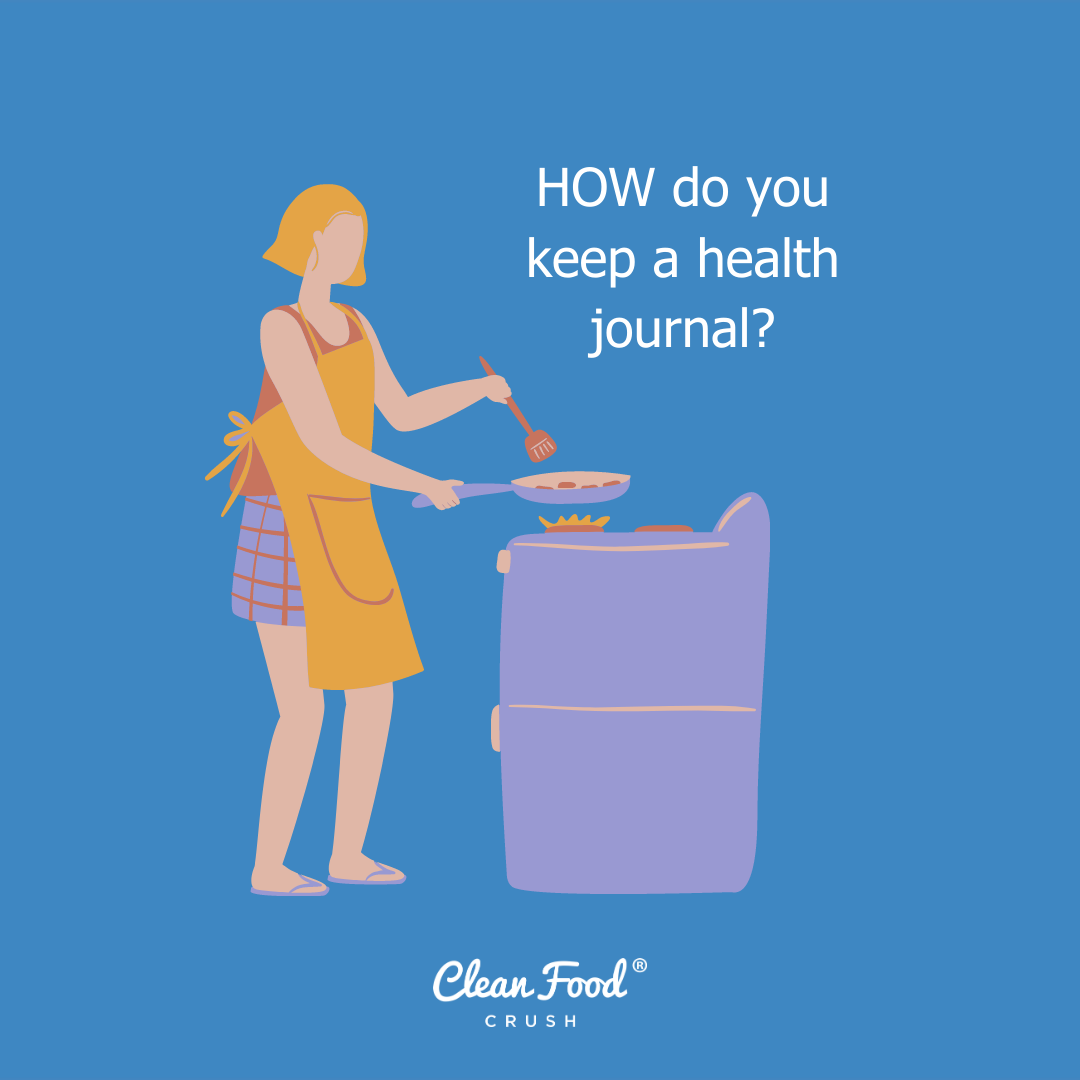
Keeping A Health Journal: The HOW
There isn’t a perfect system for keeping a health diary and there is no template that will work for everyone. Depending on your reasons for keeping it, your age, your health, and so many other factors, you may need to keep more detailed information or just a couple lines throughout the day. The goal here is to monitor what is going in and out of your body (not in an obsessive way) and how you FEEL. This is meant to help you, not hinder you.
First, you want to actually get the journal (I know, seems obvious, but bear with me). Everyone is different, but I know having something I enjoy makes all the difference. Any bound pages will work, but you may be more likely to actually keep the journal if you picked it out yourself and find it aesthetically pleasing than if you grabbed the empty journal from that back of your closet with ugly designs and no lines on the pages. Some people may want to purchase a journal specifically made to be a health journal. Other’s may want to design their own with a lineless, blank journal. Still someone else may want a leather-bound journal with graph pages. Whatever it looks like, get the journal you actually want that will work for you. And there are plenty of people who may not want a physical journal at all! You may prefer to keep a document on your laptop or use the notes app on your phone so you can jot down ideas, antidotes, or reminders on the go. Whatever it is, make sure it’s what works best for you!
Now that you have the journal, try thinking about the big picture. I know I mentioned at the beginning of this article that there are many specific health diaries you could do, but if you don’t already have one you need to do (and even if you do) you should try to focus on your overall health. This includes your physical and mental health, your nutrition habits, your water intake, your sleep habits, your exercise goals, etc.
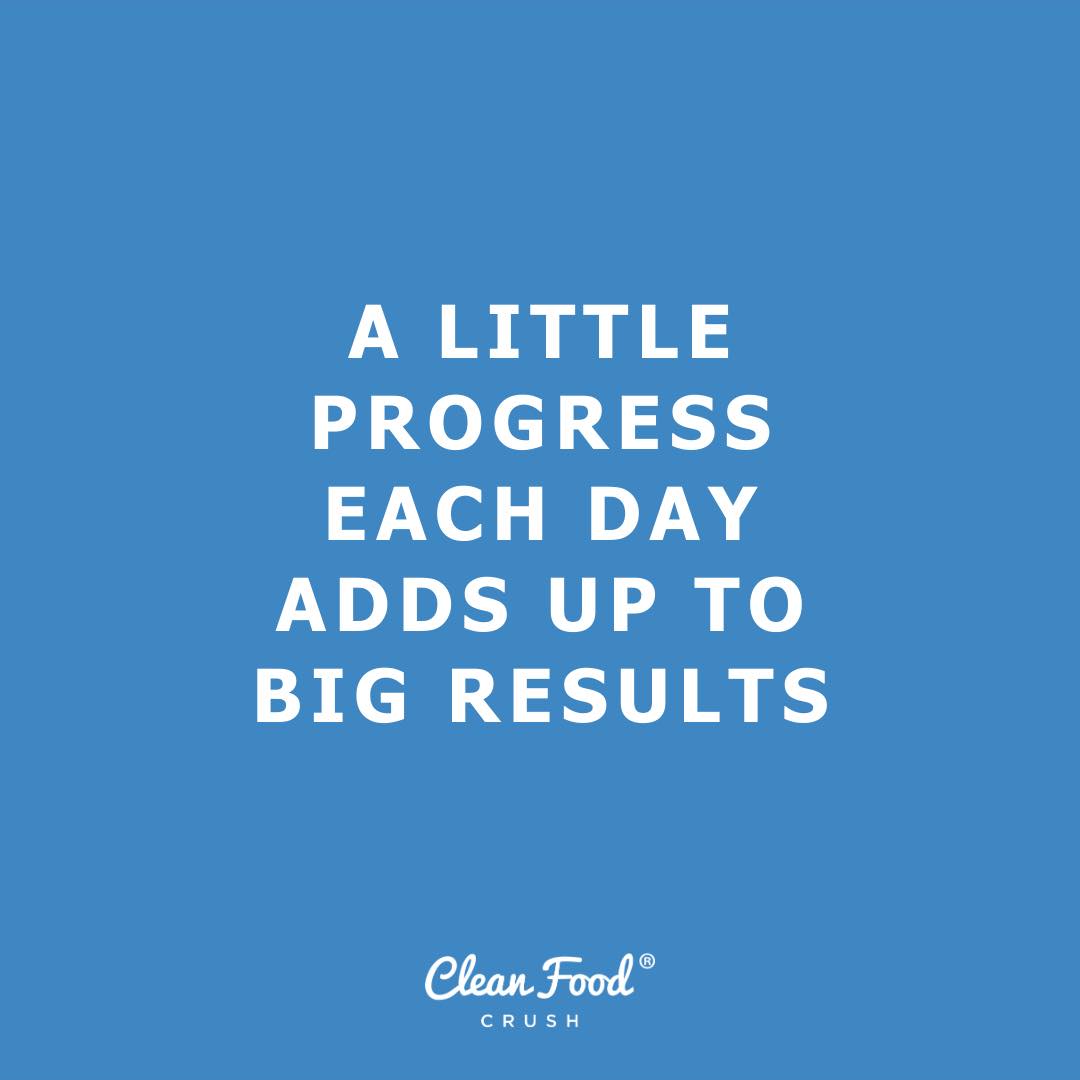
The more information you record in your health journal, the better. If you’re overwhelmed, start with just a few key aspects for your health and then as time goes on, add topics and start getting more specific about stuff that you think is important for your life. You can customize the information you include however you need to (ask your doctor for recommendations for what to include) but try to look at overall health. Some things you can include:
- Illnesses, injuries, hospitalizations – include dates, doctor’s names, causations, release dates, etc.
- Conditions that run in your family, other health issues – you may only need to write this once at the beginning of your journal. This can just be a helpful reference.
- Allergies, skin changes, rashes, etc. Did you see a pimple today? Did you suffer from bad allergies? What kind of allergies? Was your nose stuffed all day? Did your IBS flare up? Was your eczema more manageable than usual? Write it down and take stock of how you feel at the end of the day.
- Medicines, vitamins, and supplements that you take. Include how much and how often you take them.
- Water intake – when you drink and how much.
- What food you’re eating – where you got it, when you ate it, how much you ate. You may even want to categorize by food type (meat protein, non-meat protein, veggies, processed food, etc.)
- Exercise – what you did, when, how you did, how you felt before, during, and after. This can include anything from trips to the gym, runs, walks with friends, or even aggressively cleaning your bathroom!
- Sleep – When you went to bed, what you did before you went to sleep, how long it took you to fall asleep, the quality of sleep, dreams, when you woke up, etc. Certain apps, like Sleep Cycle, can do a deep dive into how well you slept, whether or not you snored, and more to help you understand more about what happened while you were unconscious for the last eight hours.
- Pain or fatigue – it’s important to pay attention to unusual pain or fatigue throughout the day. Jot that down when it happens and where it flared up. It also may be helpful to have a score system for both how bad the pain is and how energetic you feel that day (like a 1-10 point system).
- Mood – This is where those pesky emotions come into play. Pay attention to your little mood changes throughout the day. What makes you feel anxious? What excites you? When do you feel most relaxed? All of this stuff will make looking at your overall mental health so much easier.
- Hormones – Note your monthly cycle (I like to use the P Tracker app), what stage of pregnancy you’ve reached, or any idea of what could be going on hormonally on any given day.
- Bathroom visits – Are you pooping twice a day, or have you felt stopped up for three days? What about urinating? This can shine light on how much water you’re drinking and how much more (or less) you need. I know it may be gross but consider keeping track of the type of bowel movements you have, especially if you notice something out of the ordinary for you.
- Doctor’s visits – What did you go for? When did you go? What did you learn? Write down what your doctor said and any recommendations she may have given you.
While you’re doing this, try to avoid just listing medical facts or calorie counts of the food you eat. Unless you need to, I would suggest not counting your calories at all. Why do I say this? There are 2 very important reasons.
- It’s proven that nutrition information is NOT correct when listed on websites (which is why we don’t include the calories of recipes on the Clean Food Crush website). The calculations are almost always inaccurate. Depending on the actual products and ingredients you use at home, the nutritional calculations can vary drastically! So, don’t ever trust the website info. Instead, try using an app like MyFitnessPal to make your own exact calculations for quantities and products you actually use. (This is also a great tool for starting your health diary).
- I do NOT ever count calories in my own life. It’s unsustainable and only creates a lifelong hassle & constant “dieting.” The point here (unless your goals are different) is not to diet and restrict oneself of food, but to create a lifestyle change. Here at Clean Food Crush, I teach people within my private groups how to plan their meals, and understand nutrition, so that they are finally free of dieting.
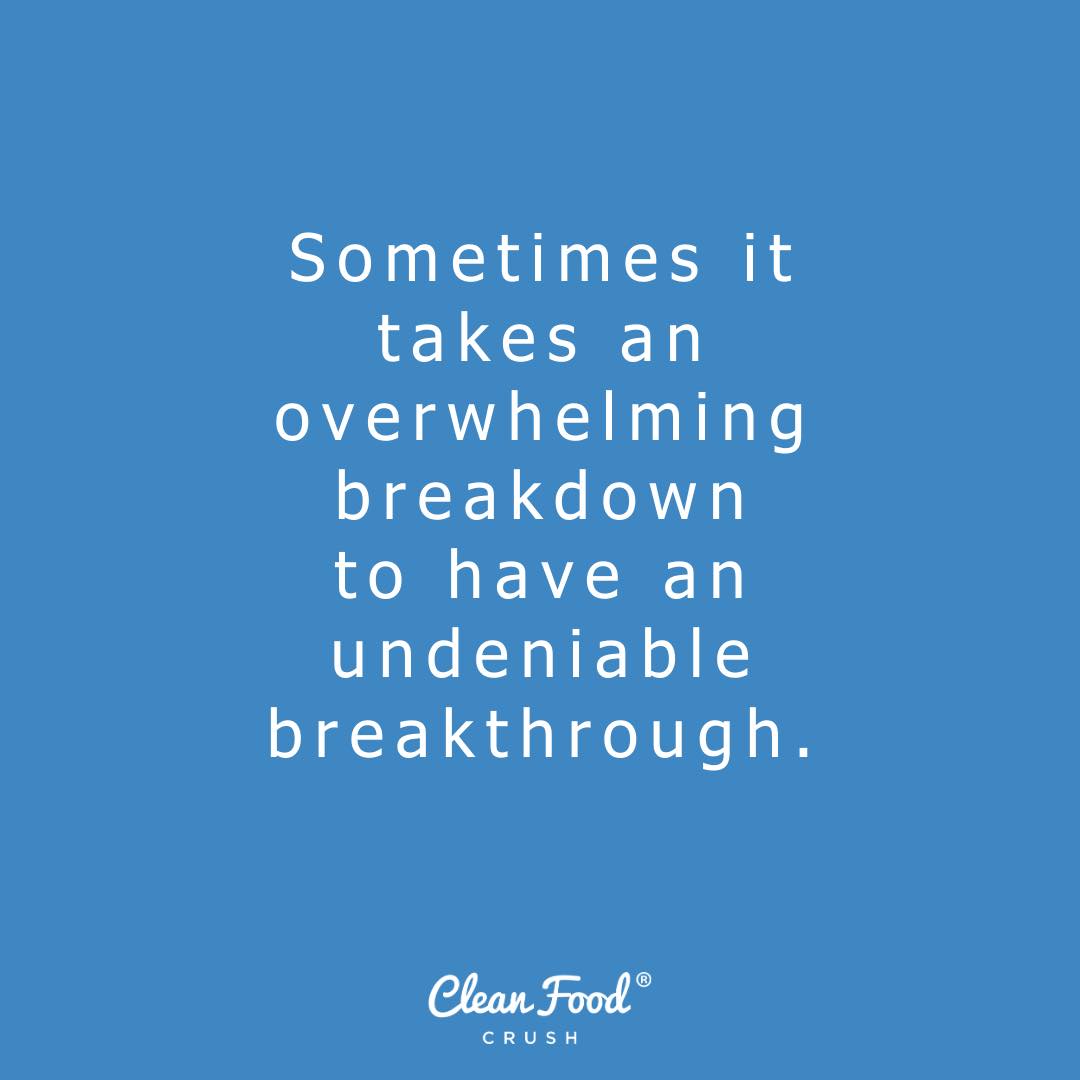
So, try to avoid that in your diary as well. Instead, keep track of the actual food you’re eating, the nutrients in it, and if you got all the necessary protein, fruits, veggies, etc. in your daily meals. And with this, try writing down your emotions and the circumstances of life around your meals.
💡 Quick tip – Avoid shame and guilt by accompanying a “bad day entry” with a motivational quote or encouragement. And write encouragement to future-you in your journal. Maybe jump forward a few pages and write it at the bottom so when you get to that part of the journal, you’re blessed with a little encouragement from past-you.
You’re recording all this not to highlight your mistakes, but to make sense of them and have an opportunity to do better next time. And the more honest you are, the better you will be able to read through the lines, identify wrong patterns and correct them, leading you to lead a healthier lifestyle. So, don’t lie to yourself in the pages of your health diary. You’re documenting your behavioral patterns, health choices, and emotions for yourself and lying about how much you work out or how many cookies you ate won’t help you do better next time.
While writing your entries, be sure to include dates and time and try to be as accurate and thorough as you can. I understand time may not always allow this, but try making note of the day, the weather, what time it is, what medications you’re on, what symptoms you feel, what friends you talked to that day, your personal thoughts, and other external factors that may have influenced your health. Some stuff may not be of any use, but it’s better to have the information and not need it than to need it and not have it.
To get you started, here is an example template of a health journal entry. Yours, by no means, has to look exactly like this, but it’s a good jumping-off point! You can always add more or take sections away.
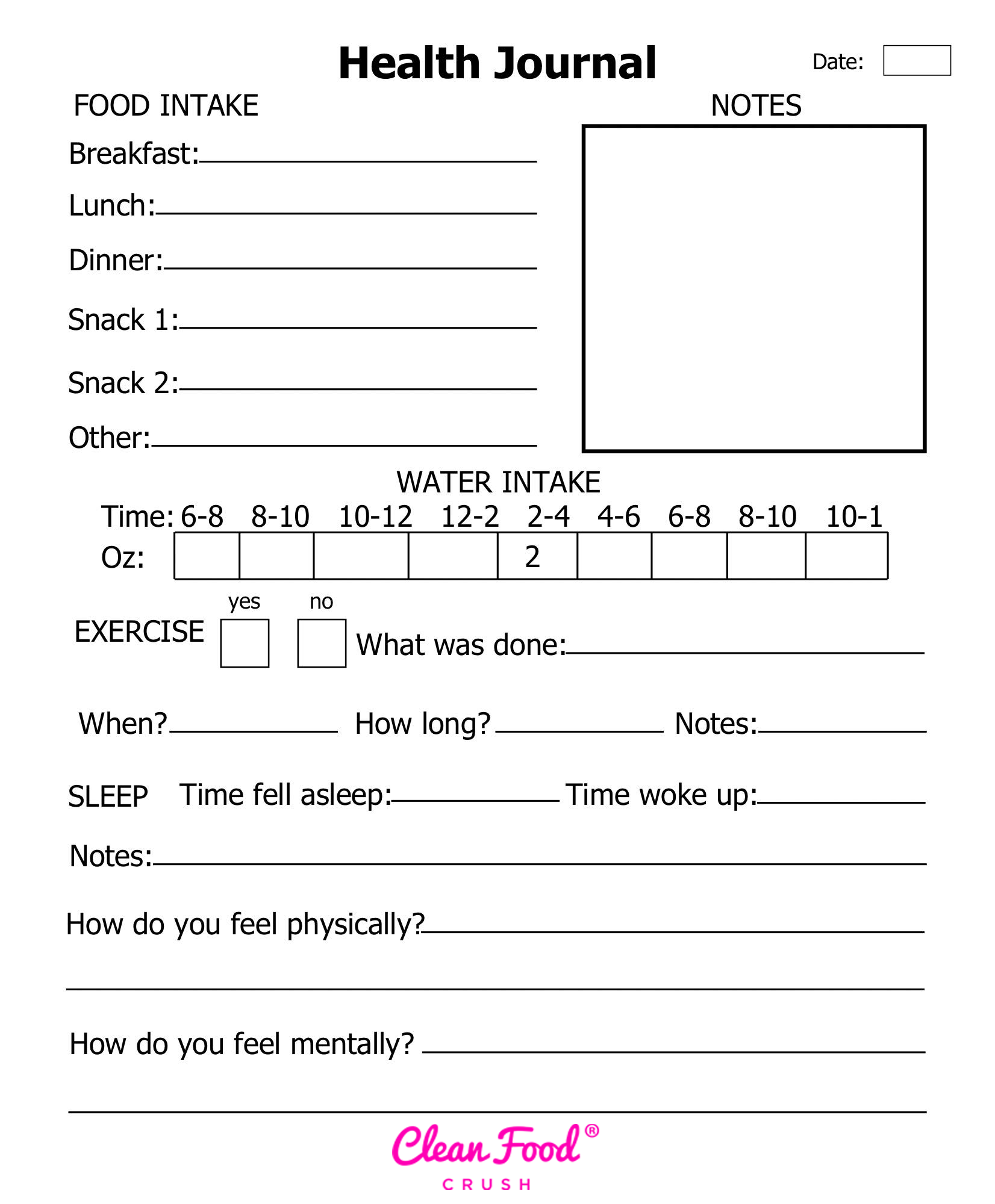
OKAY! Now that we’ve gone over the how, it’s time for you to go get that diary.
If you need to, start small and build up to detailed entries. And if you don’t want to do this alone, check out our challenge where you get a private group with support AND a food tracker example.
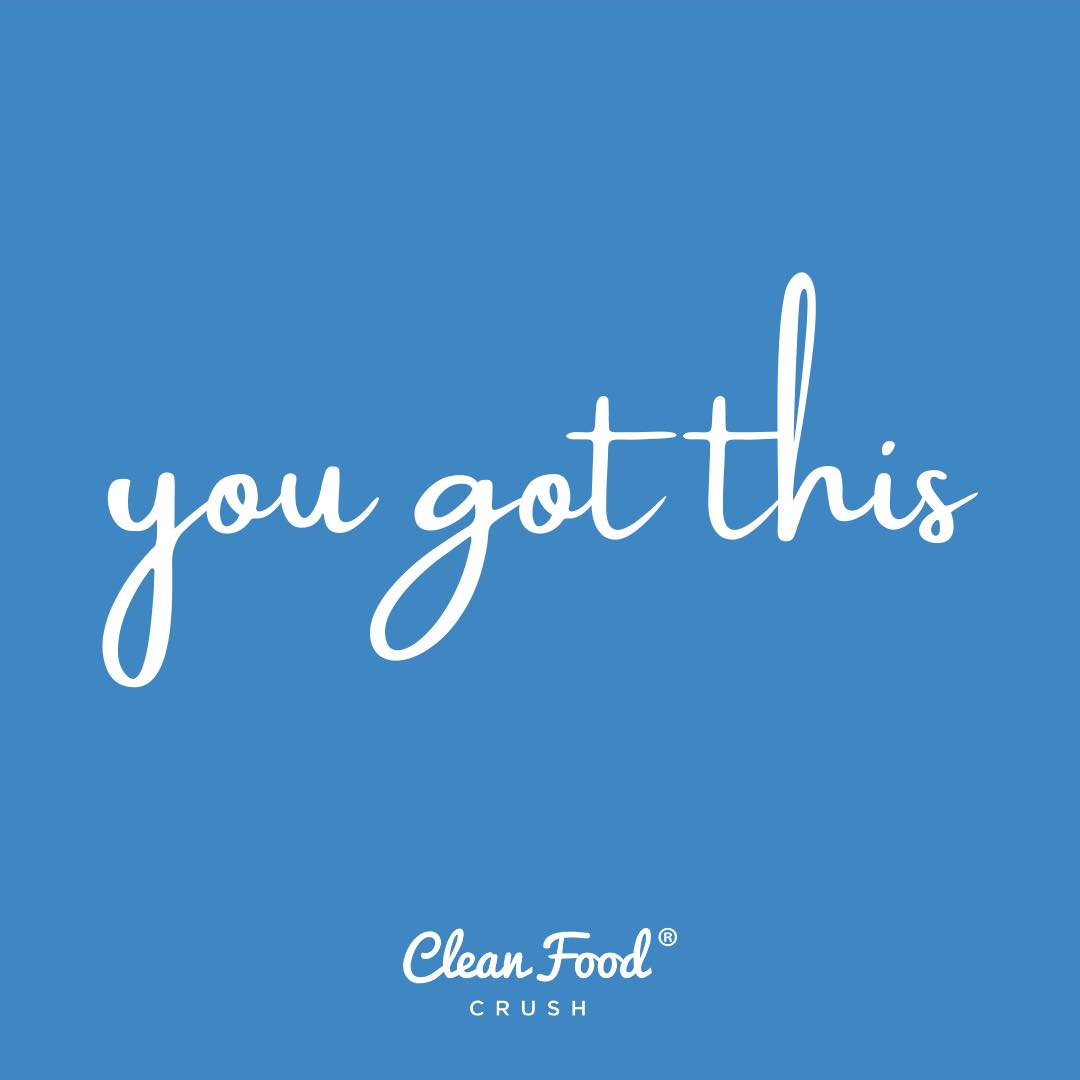
This journey is for no one other than yourself, and you have full control. You can do this!
Note: While keeping a health journal can be extremely helpful and a fantastic self-care tool, it should NEVER replace medical appointments, serve as a diagnosis, or become an obsession that rules your life. Talk to your doctor if you have any questions or concerns about keeping a health diary and to receive personalized medical advice based on your health journal and overall family medical history.
















